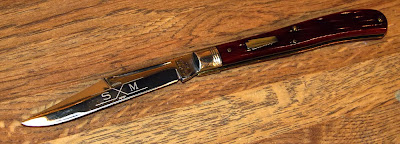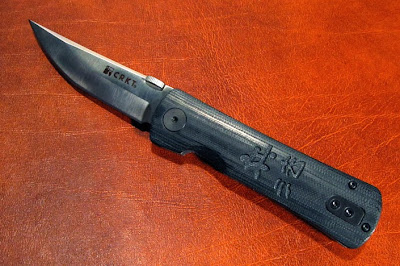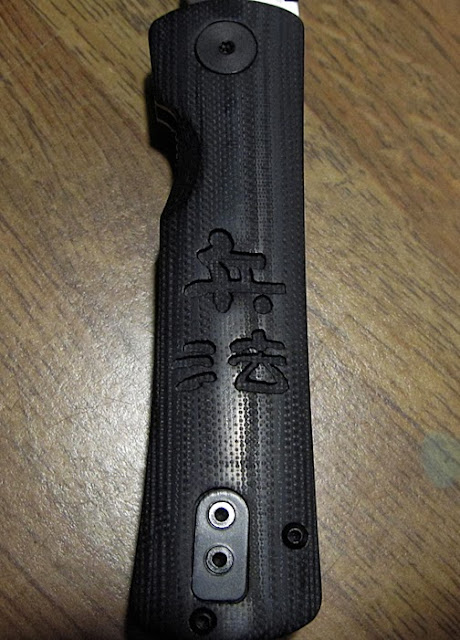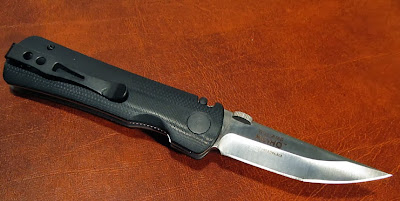I had a chance to pick up two knives recently. They are as different as you can get.
I have a friend who is getting up in years. He’s had an interesting life, but remember, interesting isn’t always good. He is from
that generation of Americans that built bridges, marched across France to kick
Hitler in the nuts and saw his children and friends beat him to the Pearly Gates. Two years ago he organized a program to send
knives to our men and women fighting in the Middle East. I think for an old guy he’s pretty cool.
Despite everything going on in his life he still buys a
knife from me once in a while. He has often
remarked he needs to sell his collection because there isn’t anyone to leave it
to. I asked him to let me know when it
was time. I wanted to buy a knife he no
longer needed to remember him by. Well
he dropped one off.
 |
| It's a nice friction folder. I like the long blade, red bone handle and the silver shield. That shield shape always reminds me of keystones. |
It’s a nice Queen Cutlery single blade trapper (041811) in
red jigged bone. He even had the
original box. I’m very happy to have it.
Queen is an interesting company. According to the 12th
Edition of Collector Knives by C. Houston Price, Queen Cutlery was a sub rosa
company at Schatt & Morgan.
Following WWI, six senior foremen started pocketing knife components
during the day. At night they assembled
them and sold them under the name Queen City Cutlery. Schatt & Morgan, who by the 1920s was
having financial problems, realized they were a house divided and quickly fired
the six foremen.
 |
| I'm not a huge fan of fiction folders, but I like the way this one is made with the brass liners. Everything is flush, tightly fitted and deep red jigged bone is spectacular. |
The loss of these six experienced men was like submerging a
submarine and leaving the hatches open.
In 1931-32 the six bought the S&M building and equipment and moved
into their old workplace, Schatt & Morgan was out of business. It’s like Jonah swallowing the whale!
Queen still makes knives in the old factory. If you like the more classic lines of
friction folders, check out Queen Cutlery.
I wasn’t able to find out much about this knife. Fortunately Queen’s historian, Mr. Dave Clark,
(http://www.queencutlery.com/Queen_Historian.html)
was able to help me out.
 |
| The Queen tang stamp has changed over the years making the knives more collectible. The addition of 92 shows it was made in 1992. Thank you Mr. Clark! |
The 92 stamped
into the tang indicates it was made in 1992 and since 1980, Queen has been using
440A stainless steel. Mr. Clark believes
the Rockwell value is around 56-57.
While softer than many blades on the market, it’s not a bad value for an
everyday friction folder.
I was surprised about the 440A stainless. I had expected a 1095 carbon steel. The truth is 440A is a low cost stain-resistant
steel with excellent corrosion resistance.
The carbon level is only 0.65-0.75 % but when hardened properly, it will
give you good, solid everyday performance.
Can’t ask for much more in a pocket knife, can you? And frankly, few of us need ultimate, life-or-death
performance from our knives.
The other knife is a NIB Heiho from CRKT. I bought it from a stranger walking the last knife
gun show who had a very good price on it.
It’s another knife I really like.
 |
| I'm more comfortable with blades that lock open. I just think they are simply safer! |
The Heiho is a James William design aimed at the tactical
office worker. With the manual LAWKS
system, the folder is billed as a “virtual fixed blade.”
The 8Cr14MoV stainless blade is one of the
newer Chinese steels that is well received in the steel community. The worst I
could find about it was “a steel used by quality knife companies in their
budget lines.” It’s a little insulting,
but accurate.
The knife utilizes a coin
opener and is assisted-opening. The
blade has a Rockwell hardness of 58-59.
The polished G10 handle has a left/right reversible clip and
the knife is carried in my favorite mode, tip up. Engraved in the G10 are two Kanji style characters. Oriental characters, in general, always worry
me.
I assume they are Japanese.
I assume they don’t mean, “when two men love each other, you are the one
who catches.” Of course we all know how
to break out ass-u-me.
 |
| While I really like the way the fabric shows through the G-10, the Kanji characters worry me. Could they mean 'fried rice' or something more sinister? |
At this point I’m hoping they stand for something innocent like 'fried rice.' Other websites indicate the 1st character means soldier or military (hei) while the 2nd pertains to technique or strategy (ho).
Combined, they signify heiho, or method of the warrior. That’s much better than fried rice.

No comments:
Post a Comment